Nouns in Japanese are called 名詞 (meishi). Nouns are the most extensive part of studies for JLPT, with hundreds to remember at each level. For N5, we have compiled 582 vocabularies that you should know, and have split them into 5 articles (100~ each) based on category which is the easiest way to memorise.
Table of Contents
- N5 Nouns List - Introducing Yourself
- N5 Nouns List - More About Yourself
- Example Simple Sentences at N5 Level
At the beginner N5 level, after you’re done memorising hiragana and katakana, the next step is to stockpile some kanji and a reasonable amount of vocabulary. With this knowledge, you are able to form basic sentences.
In this article, we have compiled 126 nouns that are useful for making easy sentences and to introduce yourself. At the end of the article are some examples of easy sentences that you can make using the nouns you have learned.
N5 Nouns List - Introducing Yourself
To start with, you need to know how to refer to yourself.
|
わたし |
私 |
I; me |
|
わたしたち |
私たち |
us; we |
|
あなた |
- |
you |
A simple sentence about yourself would go like this, “私の名前は〇〇です。(watashi no namae wa 〇〇 desu) - My name is 〇〇.” or “私は〇〇が好きです。(watashi wa 〇〇 ga suki desu) - I like 〇〇.”
Below are 5 categories of nouns; countries & languages, occupation, colours, nature, and animals, that you can use to introduce yourself.
Countries & Languages
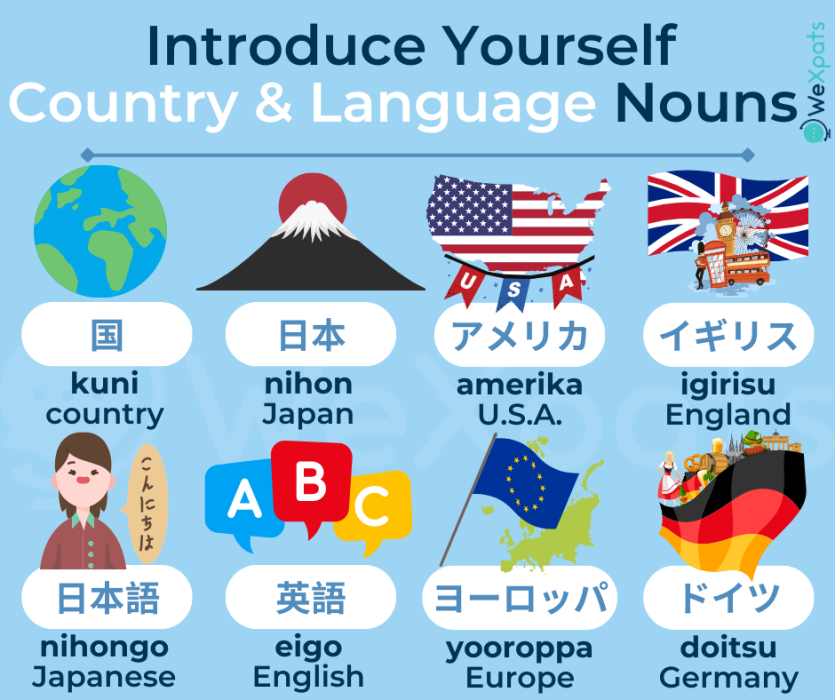
The Kanji characters that you need to know at the N5 level are indicated in BOLD.
|
くに |
国 |
country |
|
がいこく |
外国 |
foreign country |
|
がいこくじん |
外国人 |
foreign national |
Adding “~人 (~jin”) to the end of a country name will transform it into a different noun that means a person of that country. For example, Japanese is 日本人 (nihonjin), Australian is オーストラリア人 (oosutorariajin), and so on.
|
アメリカ |
- |
United States of America |
|
イギリス |
- |
England |
|
イタリア |
- |
Italy |
|
インド |
- |
India |
|
インドネシア |
- |
Indonesia |
|
オーストラリア |
- |
Australia |
|
かんこく |
韓国 |
Korean |
|
スイス |
- |
Switzerland |
|
スペイン |
- |
Spain |
|
タイ |
- |
Thailand |
|
たいわん |
台湾 |
Taiwan |
|
ちゅうごく |
中国 |
China |
|
ドイツ |
- |
Germany |
|
にほん |
日本 |
Japan |
|
フィリピン |
- |
Philippines |
|
ブラジル |
- |
Brazil |
|
フランス |
- |
France |
|
ベトナム |
- |
Vietnam |
|
マレーシア |
- |
Malaysia |
|
メキシコ |
- |
Mexico |
|
ヨーロッパ |
- |
Europe (region) |
語 (go) means language. Adding ~語 to the end of some countries names will transform it into a noun that means that countries language, but not all the time.
|
えいご |
英語 |
English |
|
かんこくご |
韓国語 |
Korean |
|
ちゅうごくご |
中国語 |
Chinese |
|
にほんご |
日本語 |
Japanese |
Occupation / Work
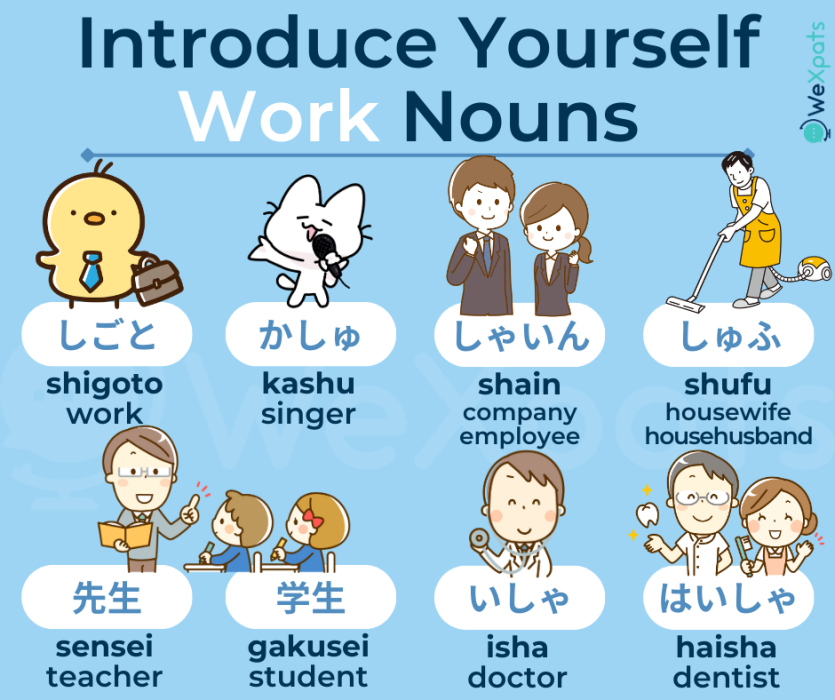
As part of your self-introduction, you'll need to tell people what you are doing now. Or, what you were doing before.
Note : Kanji characters in BOLD need to be remembered.
|
しごと |
仕事 |
work; job |
Below, we have various types of occupations.
|
いしゃ |
医者 |
medical doctor |
|
けんきゅうしゃ |
研究者 |
researcher |
|
はいしゃ |
歯医者 |
dentist |
|
エンジニア |
- |
engineer |
|
おまわりさん |
お巡りさん |
police officer (polite) |
|
けいかん |
警官 |
police officer |
|
けいさつかん |
警察官 |
police officer |
|
かいしゃいん |
会社員 |
company employee |
|
がくせい |
学生 |
student |
|
せいと |
生徒 |
pupil; student |
|
りゅうがくせい |
留学生 |
overseas student; international exchange student |
|
かしゅ |
歌手 |
singer |
|
しゅふ |
主婦 / 主夫 |
housewife; househusband |
|
せんせい |
先生 |
teacher |
|
きょうし |
教師 |
teacher |
|
てんいん |
店員 |
shop attendant |
|
ぎんこういん |
銀行員 |
bank clerk |
Writer's Pick
N5 Nouns List - More About Yourself
A good self-introduction doesn’t just contain hard facts. It also includes interesting information about yourself. Your likes and dislikes, hobbies, and more.
|
すき |
好き |
likes |
|
きらい |
嫌い |
dislikes |
Colours
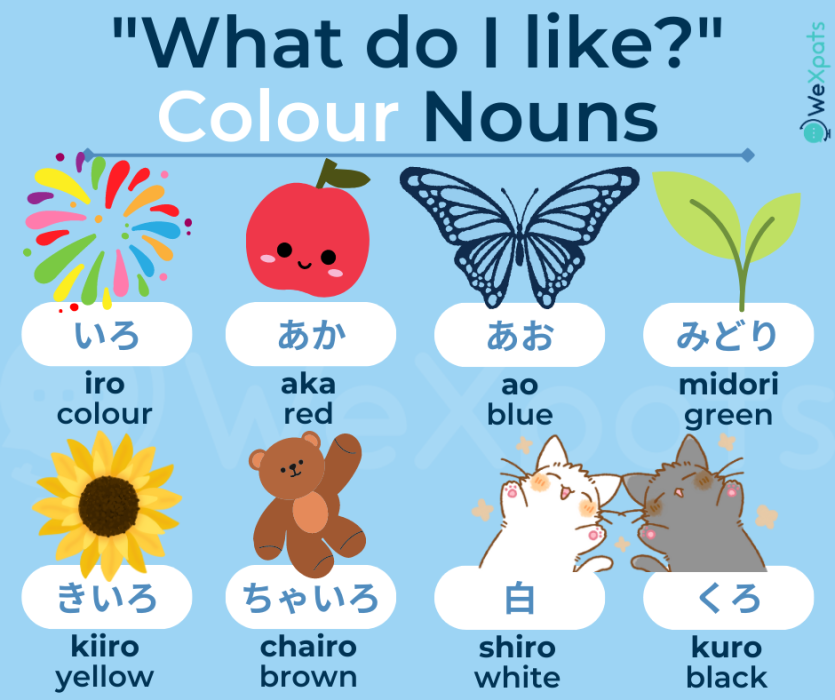
Share what your favourite colour is.
Not many colours are taught at the N5 level, and you only need to remember the kanji for “white”. Colours can be nouns or adjectives. For example, “my favourite colour is red (noun)” versus “i like this red (adjective) shirt”.
|
いろ |
色 |
colour |
|
いろいろ |
色々 |
various |
Likewise with 色々, it can be an adjective and also a noun. “色々な色 (iro iro na iro) - various colours” is something of a tongue twister.
|
あお |
青 |
blue |
|
あか |
赤 |
red |
|
きいろ |
黄色 |
yellow |
|
くろ |
黒 |
black |
|
しろ |
白 |
white |
|
ちゃいろ |
茶色 |
brown |
|
ピンク |
- |
pink |
|
みどり |
緑 |
green |
Hobbies & Interests
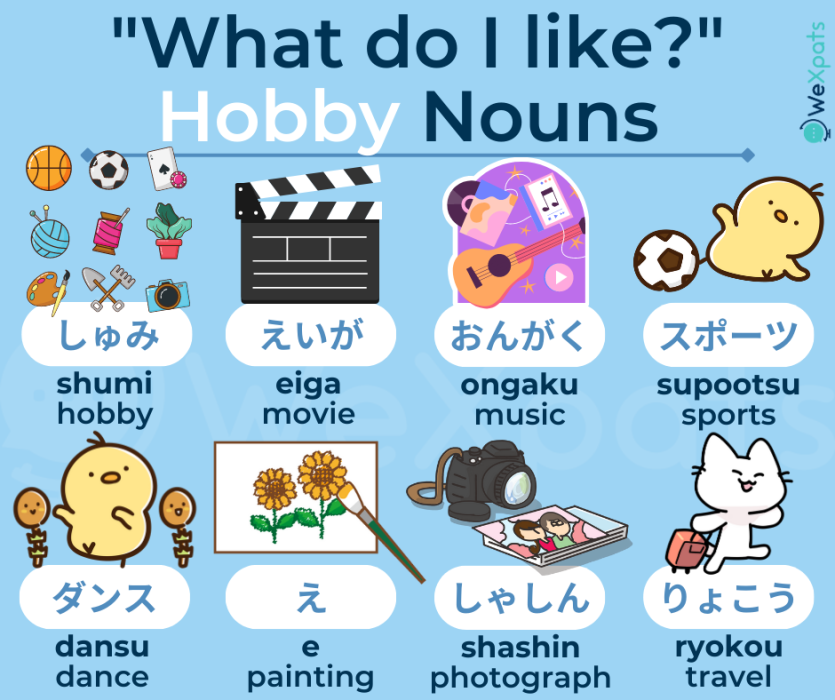
What are your hobbies & interests?
|
ひま |
暇 |
free time; leisure |
|
しゅみ |
趣味 |
hobby; pastime |
Here are a variety of hobbies, interests and things you can do during your free time. There are already many Katakana vocabulary at the N5 level.
|
いけばな |
生け花 |
flower arrangement |
|
え |
絵 |
picture; painting |
|
えいが |
映画 |
movie; film |
|
おんがく |
音楽 |
music |
|
うた |
歌 |
song |
|
ギター |
- |
guitar |
|
クラシック |
- |
classical music |
|
コンサート |
- |
concert |
|
ジャズ |
- |
jazz music |
|
ピアノ |
- |
piano |
|
カラオケ |
- |
karaoke |
|
ざっし |
雑誌 |
magazine |
|
さんぽ |
散歩 |
walk; stroll |
|
しゃしん |
写真 |
photograph |
|
スポーツ |
- |
sports |
|
バスケットボール |
- |
basketball |
|
ゴルフ |
- |
golf |
|
サッカー |
- |
soccer |
|
スキー |
- |
sukii |
|
テニス |
- |
tennis |
|
たっきゅう |
卓球 |
ping pong; table tennis |
|
やきゅう |
野球 |
baseball |
|
パーティー |
- |
party |
|
フィルム |
- |
film |
|
ビデオ |
- |
video |
|
ダンス |
- |
dance |
|
べんきょう |
勉強 |
studies |
|
やすみ |
休み |
rest |
|
りょこう |
旅行 |
trip; travel |
|
まつり |
祭り |
festival |
Nature
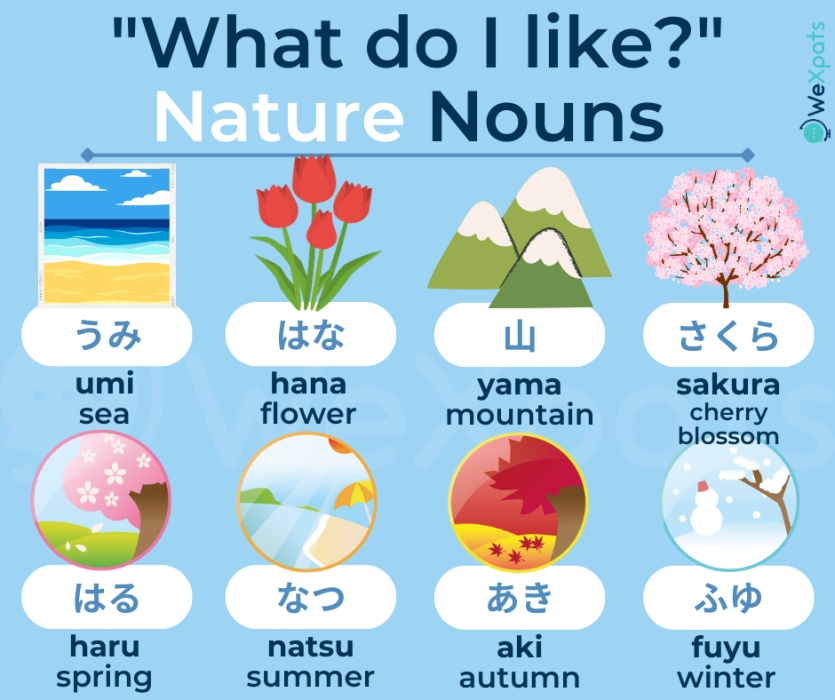
Many people love Japan for its nature. Why not share what part of it you love in your introduction? These are also useful words to learn to describe things.
Remember the Kanji that are in BOLD.
|
あめ |
雨 |
rain |
|
いけ |
池 |
pond |
|
うみ |
海 |
sea; ocean |
|
かぜ |
風 |
wind; breeze |
|
かわ |
川 |
river; stream |
|
き |
木 |
tree; wood |
|
くさ |
草 |
grass |
|
くも |
雲 |
cloud |
|
そら |
空 |
sky |
|
てんき |
天気 |
weather |
|
はな |
花 |
flower |
|
もり |
森 |
forest |
|
やま |
山 |
mountain; hill |
|
ゆき |
雪 |
snow |
|
おはなみ |
お花見 |
cherry blossom viewing |
|
さくら |
桜 |
cherry blossom |
|
こうよう / もみじ |
紅葉 |
autumn leaves; maple (tree) |
|
きせつ |
季節 |
season |
|
はる |
春 |
spring |
|
なつ |
夏 |
summer |
|
あき |
秋 |
autumn; fall |
|
ふゆ |
冬 |
winter |
Animals
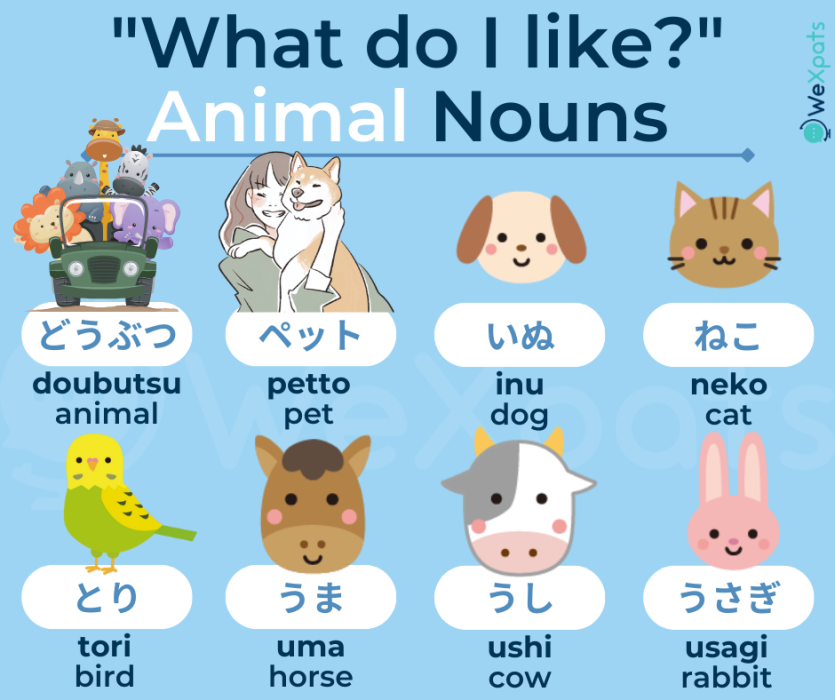
Very limited vocabulary for animals at the N5 level. Mostly common pets and livestock to help you introduce your favourite animal or any pets you have.
|
どうぶつ |
動物 |
animal |
|
ペット |
- |
pet |
|
いぬ |
犬 |
dog |
|
うさぎ |
兎 |
rabbit |
|
うし |
牛 |
cow |
|
うま |
馬 |
horse |
|
とり |
鳥 |
bird |
|
にわとり |
鶏 |
chicken |
|
ねこ |
猫 |
cat |
|
ぶた |
豚 |
pig |
Example Simple Sentences at N5 Level
A quick lesson on how to put these nouns to good use. Just change the bolded words.
1. わたしはマレーシアから来ました。
(watashi wa mareeshia kara kimashita)
- I came from Malaysia.
2. わたしは英語と中国語が話せます。
(watashi wa eigo to chuugokugo ga hanasemasu)
- I can speak English and Chinese.
3. わたしはかいしゃいんです。
(watashi wa kaishain desu)
- I am a company employee.
4. わたしのすきな色はあおです。
(watashi no sukina iro wa ao desu)
- My favourite colour is blue.
5. わたしのしゅみはおんがくを聞くことです。
(watashi no shumi wa ongaku wo kiku koto desu)
- My hobby is listening to music.
6. わたしはスポーツがきらいです。
(watashi wa supootsu ga kirai desu)
- I dislike sports.
7. わたしはあきのこうようがすきです。
(watashi wa aki no kouyou ga suki desu)
- I like the autumn leaves in autumn.
8. わたしはねこがすきです。
(watashi wa neko ga suki desu)
- I like cats.



































